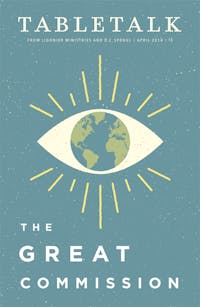
Request your free, three-month trial to Tabletalk magazine. You’ll receive the print issue monthly and gain immediate digital access to decades of archives. This trial is risk-free. No credit card required.
Try Tabletalk NowAlready receive Tabletalk magazine every month?
Verify your email address to gain unlimited access.
What are we supposed to do? Though teleology may be the most neglected of all branches of philosophy, it cannot long be ignored in our daily lives. We need to know what we are for, what the goal is. And in a harried world, it is all the more understandable that we would seek out one, clear bottom line. We want news we can use. What we can use the most is an explanation of what our calling is. We are aimless, directionless when we don’t know where we are headed. This may explain why God’s Word is so rich in bottom lines, in quick, understandable summaries of our calling. The One who made us is well equipped to tell us what we are for.
We could start at the beginning. In the garden God gave our first parents what theologians call “the dominion mandate.” He called on them to fill the earth and subdue it, to rule over the birds of the air, the fish of the sea and every creeping thing that creeps upon the ground. Lest we should think this calling fell away when our parents fell, we should remember that it was reiterated to Noah and his family when they left the ark.
Moses, of course, gave us the great commandment, that we should love the Lord our God with all our heart, mind, soul, and strength, and the commandment to love our neighbor as ourselves. That sounds like a bottom-line kind of command, especially when we consider that Jesus tells us that all the Law and the Prophets hang on these (Matt. 22:40). The prophet Micah gave us what might be called an “executive summary” of what the believer is called to do. The Micah mandate says we must do justly, love mercy, and walk humbly with our God (6:8).
One could in turn argue that Jesus, in the Sermon on the Mount, finally settled things when He commanded us to seek first the kingdom of God and His righteousness (6:33). Or, alternately, we could look to the Great Commission.
What, though, do we do now? We started out looking for direction. The Bible was quick to give it, but which of these telē, or purposes, is highest? Which of all these bottom lines is the bedrock bottom line? Or, are we left free to pick and choose? Perhaps God calls some of us to be dominion mandate guys and others Great Commission guys. Maybe some of us were once Micah-mandate guys, but we have transitioned into seek-first-the-kingdom guys.
My spiritual forbears, the Westminster Divines, came up with a rather odd solution to this surfeit of purposes—they added one more. Man’s chief end, they tell us, is to glorify God and to enjoy Him forever. As counterintuitive as this solution might seem, to add one more to an already too long list, it actually highlights the solution. We don’t have competing sets of direction, contrary maps. We have instead a variety of ways to say the same thing.
Jesus is the second Adam. That glorious reality certainly encompasses the equally glorious reality that just as in Adam all fell, so all those in Christ are made alive. But there is more to this connection. The first Adam, in falling, did not merely fall but failed. That is, because he ate of the Tree of Knowledge of Good and Evil, he not only failed to obey God, but he failed to exercise dominion. Noah likewise failed, as did Moses after him. Even Micah failed.
Jesus, however, never fails. Though His test was alone in a wilderness, He faced and defeated the temptations of the devil. At Calvary, His heel was bruised, but with His first step out of the tomb He crushed the head of the serpent. At His ascension, as He proclaimed, all authority in heaven and on earth had been given unto Him. Now He is about the business of bringing all things under submission so that at the last day He will hand the kingdom back to His Father. For He must reign until all His enemies are under His feet.
It is out of this gospel confidence that we are called as a helper suitable to Jesus, the second Adam. The church is His bride, the new Eve. Our labors are to help Him fill the earth and subdue it, to lead His own in loving the Lord our God with all our being and in loving our neighbor as ourselves; in doing justice, loving mercy, and walking humbly with our God; in seeking first His kingdom; and in fulfilling the Great Commission. All this we labor toward as we make His name known, His reign visible across the globe, until the earth will be filled with His knowledge as the waters cover the sea (Hab. 2:14). We go forth with peace and certainty as we go therefore and make disciples of the nations, baptizing them in the name of the Father and of the Son and of the Holy Spirit, teaching them to observe all things that He has commanded us. For lo, He is with us always, even unto the end of the age. This is the end of our beginning, and the beginning of our end.
